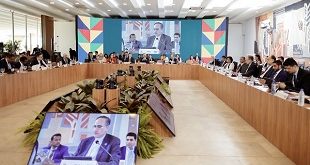We need to take responsibility for ourselves, to empower our people. External assistance is okay. But we need to begin with our own solutions.
And so it was that on my flight from Amsterdam to Dubai I stumbled upon a documentary on poverty in Malawi by singer Madonna. Like most Western movies, documentaries and news about our continent, this too was a story of Africa’s persistent failure and the efforts of the West to save us from the vagaries of nature and the “rapacity” of our rulers.

The script had the usual suspects; children with mucus filled noses and jigger infested feet, orphans without food or shelter, the poor living in grass thatched huts, a miserable-looking mother with a malnourished child tied to her back as she stretched her emaciated hands to receive charity from a white aid worker. Against the backdrop of these images are interviews with those trying to save the people of Malawi – Bill Clinton, Jeffrey Sachs, Paul Farmer, Erick Borgstein and Victoria Keelan.
There are a few Malawians brought in to tell the story of course; a member of parliament, a church leader, the deputy minister of local government, a civil society activist, the minister of foreign affairs and a Malawian PhD holder. As expected, the people of Malawi are presented as passive victims of nature and bad government; with their story to tame and harness nature for their survival, and their political struggles to change their reality, conspicuously absent. Their emancipation from misery, Sachs and Farmer tell us, is the responsibility of the rich people of the Western world.
“The West has a duty,” Sachs says with confidence and certainty, “to help these people have a future.” Clinton agrees entirely. In short, the people of Malawi are not supposed to be active participants in their own emancipation. They are supposed to be passive recipients of international charity.
As I watched the Madonna documentary, I remembered that some months back I had watched actor George Clooney and activist John Prendergast on Larry King Live talking about Darfur. The story of Darfur was not being told by those who suffer the costs of the crisis. It was Clooney and Prendergast who were speaking for and on behalf of the suffering people of that region. This suffering has now become an opportunity for celebrities living in opulence to show off their humanity.
Clooney was hopelessly out of depth on the problems of Darfur – coming across as someone who had been hastily mobilised to support a cause he did not know much about. Yet Larry King was more interested in interviewing him. Prendergast seemed better informed, yet King was disinterested in what he had to say.
But both Clooney and Prendergast shared one narrative; that the salvation of the people of Darfur will not come from their own struggles. It would come from the charitable actions of an abstract entity called the “international community” through its obligation “to protect”; oh, and of course the great and most benevolent of all – the altruistic and exceptional people of America without whose kindness the world would not exist, at least not as we know it today.
In spite of knowing the facts, Prendergast was superficial; he seemed ignorant of the structural and historical processes that are shaping politics and conflict in that region. He did not seem to understand the complexity of the problem. Yet he still would have shed more light on it had Larry King cared more about the people of Darfur than about giving Clooney airtime to exhibit his humanity.
Many Western interventions to save Africa are rarely about the supposed victims. Instead, they are platforms for Western people to exhibit their altruism. Evolutionary psychology tells us that women tend to fall in love with men who exhibit kindness and generosity, attributes that gave our ancestors decisive advantage in the dating market and therefore made them successful reproductively.
The Larry King show featuring Clooney and Prendergast was not intended to highlight the suffering of the people of Darfur; their daily struggles to overcome adversity, their aspirations and their hopes. It sought to promote the narrative of America as saviour of the world.
So this brings me back to Madonna and her struggle to save Malawi. That central African country is a democracy – at least as Washington, Paris and London would prefer – with a free press, an elected parliament and elites alternating in power from ruling to opposition party etc. Yet as the story unfolds, the deputy minister for local government complains that children of her constituents regularly come begging her for fees. “I try to help,” she says, “But I cannot help everyone.” And what is the cost of fees? It is only $ 12 per term.
The minister of foreign affairs, Joyce Banda, also features in the documentary explaining the lack of vision, poor leadership at the local level (as if the central government is better) and the increasing spread of superstition in the country. She seems unable to see that people are increasingly turning to traditional healers (whom she calls “witch doctors”, a colonial categorisation) because public hospitals are malfunctioning.
So, the failure of Malawi’s democracy to serve ordinary people was obvious. Why should a minister pay fees for her constituents from her personal income? Why isn’t Malawi’s democratic process fostering an impersonal application of public policy? Clearly the people of Malawi are not rights-bearing citizens. They are clients of these powerful politicians. That is why they do not demand rights from the state but beg for favours from their MPs.
As I write this article, there are more Malawian doctors trained at government expense living and working in Britain than there are in Malawi itself. Malawian professionals have voted with their feet and left. Yet the world may remain happy with Malawi because it meets the conventional models of a democracy. Africa needs to begin a conversation about how its people are integrated into the emerging democratic structures.
Throughout the documentary, Malawi and through it Africa is stripped of self initiative. The story of persistent failure and misery makes you think that there is nothing positive that happens in that country – except of course Madonna’s apparent wonderment that in spite of their poverty, Malawians are still happy: The children play, the youths smile and cheer, the elderly laugh and hug each other in mutual affection.
What is missing is the story of innovation in Malawi; the business people who are creating new ways to make money and therefore employing hundreds of thousands; the farmers who are improving their wellbeing through adoption of modern farming technologies; young professionals like those in Kenya who created mobile money that is changing life on our continent without foreign aid; and small traders and craftsmen and women who are creating many things out of nothing.
 The Independent Uganda: You get the Truth we Pay the Price
The Independent Uganda: You get the Truth we Pay the Price



